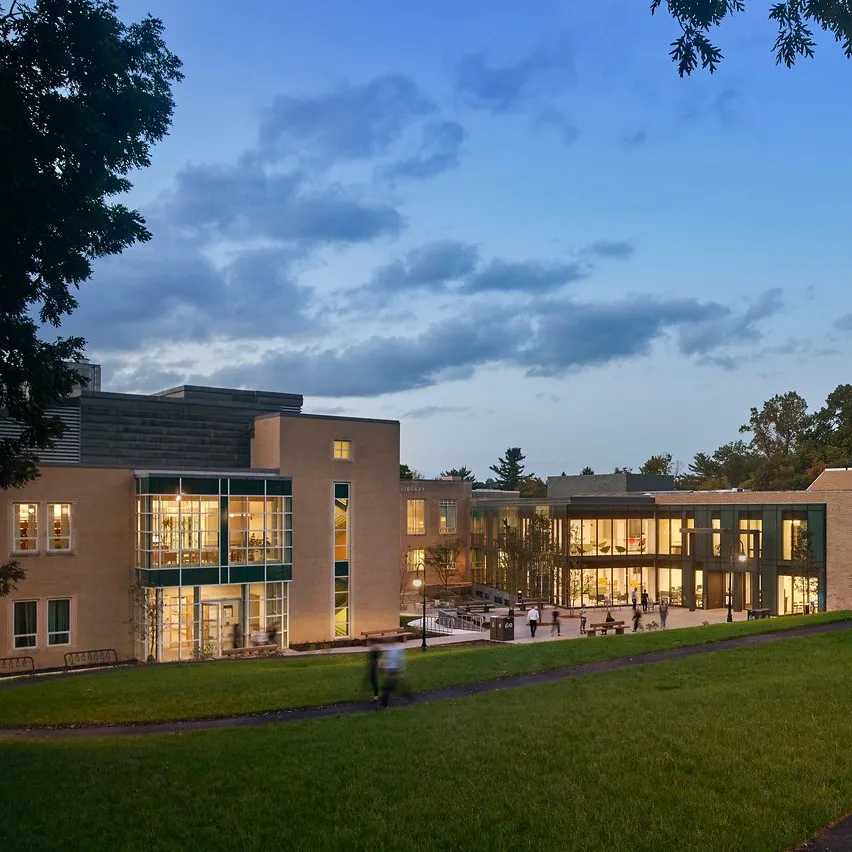
Prepare
We can help you prepare for a career in the health professions.
Because Bryn Mawr has no “standard” prehealth track, students can develop their academic plans in consultation with their dean, faculty advisors, and the prehealth advisor. Ultimately, prehealth students should major in subjects that capture their intellectual passion.
Students can consider the special academic opportunities they’d like to participate in at Bryn Mawr (such as 360° Course Clusters, Praxis courses and independent study, and study abroad). With planning, many students find ways to pursue a compelling major and other lively academic and extracurricular involvements while fulfilling the prerequisites for the health professions schools that interest them.
Explore
Bryn Mawr offers many exciting academic opportunities of interest to prehealth students. Students should develop their academic plans in consultation with their dean, faculty advisors, and the prehealth advisor. Students are urged to develop a long-range plan as they enroll at Bryn Mawr, and to revisit it each semester in consultation with advisors. This would enable students craft ways to engage in stimulating courses and rewarding activities while fulfilling the prequisities for the health professions schools that interest them. Make an appointment with Assistant Dean Gail G. Glicksman to discuss your prehealth pathway: gglicksman@brynmawr.edu, 610-526-7350.
This is an exciting time to prepare for the health professions. Educators in all types of health professions programs are reconsidering the ways that their fields can prepare students to meet the emerging global health needs. Health professions schools are identifying competencies that are essential for entering students. Over time, they are articulating ways that these competencies can be considered in the admissions process. Allopathic medical schools have been leading the way in designing guidelines for competency-based preparation for application. Some schools have been moving away from identifying specific course requirements. They still require specific areas of content.
Recognizing that scientific fields are changing and emphasizing multidisciplinary approaches, medical schools realize that some students can gain the knowledge through courses with different titles. All these schools still require students to gain knowledge in specific areas. Many of these schools point out that classes still remain the most effective way to gain knowledge and skill in these areas. Further, in some cases, they are requiring more knowledge than the “traditional” sequence of courses.
The knowledge is still needed, but schools are willing to consider a broader range of approaches to mastering the material.
Also, please note that most schools require the Medical College Admission Test (MCAT). Please visit the AAMC site to learn about the exam, what to expect on test day, and how to register for a fee waiver or for testing accommodations. This site includes extensive information about the topics covered on the exam, so students can use this resource to ensure that they are engaging in academic experiences that would help them perform effectively on the exam.
Although there is a traditional set of prerequisite courses that has been required by many professional schools, there is not a core that works for all professions or for all schools within a specific profession.
The Health Professions Advising Office has collected information about the MCAT and about tests for other health professions schools. Visit the HPAO resource room in Canwyll House to view copies of test books prepared by various test preparation companies.
Bryn Mawr College students take a variety of approaches to prepare for the the relevant standardized tests. Many find it helpful to consider the strategies that helped them prepare for previous tests and to discuss the range of options. Please keep in mind that Bryn Mawr has negotiated a special discount for students or alums seeking online or in-person prep courses for the DAT, GRE, MCAT, OAT, and the PCAT. Consult the Health Professions Advisor for more information.
- Guide for First- and Second-Year Prehealth Students
- Join the Prehealth Listserv, which the Health Professions Advising Office uses to send useful information, including announcements about special events on campus, research and internship opportunities, application deadlines. The undergraduate student Prehealth Society also announces its meetings and activities over its listserv.
Preparing for a career in the health professions means more than just classroom preparations. Learn more about the core competencies endorsed by the Association of American Medical Colleges for incoming medical students, and about other ways to prepare for health-care-focused careers.
In addition, the Health Professions Advising Office organizes and sponsors events and workshops on campus throughout the year, and has sponsored and co-sponsored programming on a variety of topics, including s presentations and discussions about Bryn Mawr graduates' firsthand experiences in health professions school.
Students interested in the health professions find that summers are ideally suited for gaining experience related to the health professions and to the biomedical sciences. Many students find ways to engage in scientific research or to assist in health-related settings. Although some students participate in formal, organized programs, others craft informal opportunities. Contact the Health Professions Advising Office to discuss your interests and circumstances as well as strategies for seeking programs and crafting opportunities. For information about funding, visit summer funding. The external links below describe more summer experiential learning opportunities.
- AAMC Summer Program Database
- Explore Health Careers
- Fred Hutchinson Cancer Research Center, University of Washington, Biomedical Research Opportunities
- National Association of Advisors for the Health Professions Summer Opportunities
- National Science Foundation's Research Experience for Undergraduates
- Rochester Institute of Technology's Science Student Internship Database
- Summer Health Professions Education Program
- Swarthmore College's Health Science Office Summer Opportunities
- Syracuse University's Directory of Summer Program
As described in other sections of our website, health professions educators have been articulating the core competencies that are essential for their fields. Increasingly, they are seeking students who have demonstrated evidence of these skills before applying for admission.
One key element that is gaining increasing attention is experiential learning through participation in community service and involvement in health care contexts and in health-related research. More than in the past, schools are seeking students who have demonstrated a genuine interest and awareness of the field. They also perceive these as wonderful settings to gain some of the interpersonal, intrapersonal, thinking and reasoning, and scientific competencies.
Before applying to medical school you will need to gain some experience working in a clinical setting. The Health Professions Advising Office and Civic Engagement maintain a directory of health care volunteer opportunities in the greater Bryn Mawr and Philadelphia area. Read the healthcare volunteer blog. Set a time to meet with the prehealth advisor to discuss your specific goals and interests, any specific constraints you’re facing, and to consider the types of volunteer experiences that would enable you to offer service to others while exploring your fields of interest.
New college students may want to participate in one of the many established community service programs through Civic Engagement, which maintains a database of local volunteer opportunities and a library of interesting and useful publications for students seeking volunteer opportunities. Students volunteering in the greater Philadelphia area are also eligible for partial reimbursement of their transportation costs to and from their service site.
Career Planning provides many resources to help students find summer internships, and the career counselors will assist with resumes, cover letters, and mock interviews. Of particular interest to prehealth students is Career Planning’s extern program. Bryn Mawr College alumnae invite current students to shadow them at work during winter or spring break. Visit Career Planning to fully explore their resources.
Many organizations sponsor service trips that enable students to learn about health care delivery in other countries, or language immersion programs that include clinical healthcare shadowing opportunities. Below are links to some resources to help you research international opportunities.
It is essential to research thoroughly any international services program and to critically assess the programs arrangements for student and client safety, for housing and transporting students as well as the total costs of participation. Some programs allow students to provide hands-on patient care or to engage in other activities that they would not legally or ethically be allowed to do in their home country.
Review the following guidelines regarding the level of involvement of students in patient care abroad:
- Guidelines for Undergraduate Health-Related Programs Abroad prepared by the Forum on Education Abroad at the request of the U.S. Department of Justice
- Association of American Medical Colleges (AAMC) guidelines (PDF)
- American Dental Education Association (ADEA) guidelines (PDF)
Review Child Family Health International's (CFHI) collection of global health information, which includes practical information about preparing for international health experiences. Consider reading a new handbook for students by Akshaya Neil Arya, Preparing for International Health Experiences: A Practical Guide.
Schedule an appointment with Dean Glicksman to discuss additional resources: gglicksman@brynmawr.edu.
- What is a Glide Year?
It is now very common for people to work for one or two years between college and medical school. This is commonly referred to as a "glide year." Medical schools often look favorably on candidates who are more mature and bring some “working world” experience with them when they begin their medical studies.
Approximately 80 percent of Bryn Mawr applicants graduated from college and then worked for a year or more prior to enrolling in medical, dental, or veterinary school. During the glide year(s), many alums have worked as scribes at hospitals and clinics or as research assistants for biomedical, translational or clinical research projects in universities. Some have served with the Peace Corps, Teach for America, or AmeriCorps. Others have assisted with health-related work in government or not-for-profit organizations.
The Career and Professional Development (CPD) Office works with students and alumnae who are looking for internship and job opportunities in the health professions field. Be sure to work closely with the CPD as you explore glide year job opportunities.
- Postbac Programs
Some graduates pursue training for prehealth professions schools after they complete their undergraduate degrees. Postbaccalaureate prehealth programs — often described as “postbac programs” — are designed to help individuals prepare for the academic and other competencies they need for training in the health professions. The two main types of programs are “career changer” programs (for those who decided to pursue health care either late in or after college) and “record enhancement programs” (for those seeking a chance to strengthen their academic preparation for graduate study in the health professions).
Bryn Mawr College is proud of its “career changer” program, which is one of the nation’s oldest, strongest, and most respected postbaccalaureate premedical programs.
Although most postbac programs are designed for students preparing to enroll in medical school, many programs accommodate students with the additional courses needed for some of the other health professions.
- For an introduction to postbac programs, visit the Association of American Medical Colleges (AAMC) postbac section.
- Also visit the AAMC Post-Baccalaureate Premedical Programs Database, a searchable resource, which includes filters for program characteristics such as type of program or location. It includes programs that accommodate students interested in health professions other than medicine and those designed for students in backgrounds underrepresented in medicine.
Bryn Mawr College undergraduates and alums are encouraged to talk contact Gail Glicksman, Assistant Dean for Health Professions Advising, to discuss postbac preparation for health professions schools.
Schedule an Appointment
Make an appointment with Assistant Dean Gail G. Glicksman to discuss your prehealth pathway.

Contact Us
Health Professions Advising Office
Park Science Building
Room 349
610-526-7350
hpao@brynmawr.edu
Open year-round
Monday-Friday, 9 a.m.-5 p.m.